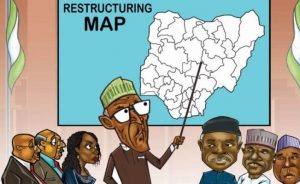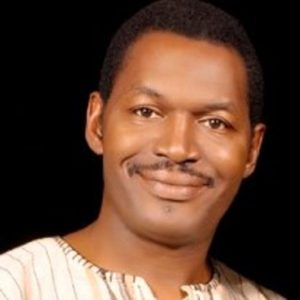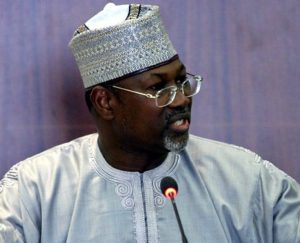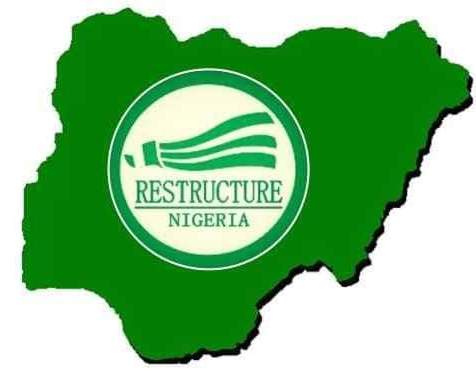Nigeria is on its knees and everyone is screaming for a way out. Restructuring appears to have won but is restructuring problem free? The question makes hoarding this article to amount to denying the restructuring debate a vital input even as publishing it can also invite all manner of decontextualised reading typical of nowadays. This is more so that reaching the author whose 1998 newspaper view it is failed. In the end, it is being republished unedited, hoping that readers will have it at the back of their minds that this is a 1998 position. This is no longer an attack on June-twelvers but early warnings on restructuring Nigeria. If and when the author, one of the most academically brilliant and politically educated professors in contemporary Nigeria, is accessed and he still thinks it is worth his name, the name will be inserted.
Following the demise of the second Republic and the ascension of military rule since 1983, there has been this significant concern with the nature of the Nigerian nation and the state. There has been attempt to reformulate the concept of federation or its foundation in Nigeria. This is, of course, understandable in the context of development after the anti-SAP riots of 1986 when the Nigerian military blocked the avenue for discourse thereby compelling the various interests to resort to their primordial forms. The culmination of this tendency was the Orkar coup which articulated, in vulgar form, this negation of the principle of federalism.

Awaiting Buhari to cut the carcass into parcels for each nationality
The underlying assumption in this tendency has been that Nigeria is a federation by accident. That is, it has not been a federation that evolved out of consensus of the component parts but rather an arrangement between the colonialists and those who took over power from them. And that since that arrangement was sealed in 1960, the control of power has been in favour of one group in the colonially imposed federation. Following the annulment of the June 1993 presidential election popularly called June 12, this tendency has indeed increased, has almost dominated political discourse.
Now, it is important to critically look at these presuppositions. With regard to the concept of federation, those who are now calling for sovereign national conference and insisting that that the logic behind it is to resolve those problems contingent on skewed form of Nigeria federation are assuming that you need all the federating units to agree on the structure and character of the federation and, on that basis decide how the Nigerian State itself should be. What is clear from this agitation especially by the so-called pro-democracy groups and some leaders from the Eastern and the South-West is that they do not think that a Nigerian nation which is pluralistic can emerge. Their assumption is that the Nigeria state itself should be a conglomeration of semi-autonomous nationalities. That is, they do not accept the principle of integration; of centralized planning; of allocation of resources and of social control, whether it is of the police, army or the courts. These suppositions are predicated on an attempt to manipulate the structural and social distortions within the federation.
It is true there are discrepancies between communities or entities but it is also true that these discrepancies manifest in the inequalities between urban and rural areas; the gap between the rich and the poor which is now very wide. There are also inequalities between the same environment. So, what you have really in all these agitations for Sovereign National Conference, for redefinition of the federation, for regional armies are essentially are essentially articulations of disenchantment by people who have lost out in the hegemonic tussle of the Nigerian ruling class itself. And what they have done is to redirect their attention to all the strata of inequalities in this country and to then obliterate the dynamism of these inequalities, give them an ethnic character and to proceed on that basis to call for the redefinition of federalism. This is because their argument is simply a blind argument. And on three grounds! One, it ignores the depth of existing social integration in Nigeria. Urbanisation has brought several people together in such a way that it is very, very difficult to draw a clear demarcation in territorial terms and allocate them to any single nationality in this country, big or small. It is difficult to define neat territories for any Nigerian nationalities in the pool of urbanisation. This modernism is uniting people in different ways, sometimes in unequal and contradictory forms but nonetheless promoting common territory.

University of Ibadan’s Prof Aiyede who recently intervened on restructuring
If you put this together, it becomes extremely difficult to understand the argument that the Nigeria federation should be designed to be a conglomeration of semi-autonomous ethnic entities. About 30 per cent of the Yoruba population lives up North. A significant component of the Northern groups also live in the South. There is a strong, sometimes even influential Hausa communities in Ibadan, Shagamu, Lagos. It is the same if you go to Portharcourt, Onitsha, Calabar just like almost 50 per cent of the Ibos live outside Iboland. How do you now draw their ethnic demarcation? That is one blindness of this argument which ignores the distinction between ethnic identity and citizenship – so blind to the dynamism of the processes that have brought Nigerians together. If you define the Yoruba nation as essentially a nation that is bound by common language and culture, how are you going to account for the more than 30 per cent of Yorubas who are outside, who even if they speak that language have nonetheless assimilated other cultures? It is applicable to the Hausas and so on.
Secondly, this agitation thinks that the problem of this country is ethnic. We don’t have to go far to understand and accept that the most fundamental inequality in the society is economic in nature. The antiSAP riots brought that out clearly. There is a crop of elite which is affluent, powerful and of course, acting above the law. And you have a very large army of impoverished people who are victims of everything else that the elite do, irrespective of their own tribe. That means that the contention that the strongest manifestation of inequality is ethnic is false. Of course, it is true that this very inequality is not evenly distributed as some areas bear the brunt more than the other but being blind has led to a serious strategic error in the so-called struggles that these groups calling for restructuring of the federation are pursuing.
For their strategy assumes that the North is the trouble with Nigeria. That is how they put it. So the North becomes the equivalent, in their view, of oppression, tyranny, manipulation and so on. This shows that if we want to understand some of these agitations, we must go beyond what is being acted and look at the interest that is being pursued which is what I stated earlier on that this arguments for restructuring the federation is the option of those who have lost out in the hegemonistic tussles of the dominant social class in the country, the elites. You cannot find any significant difference between the elites of the West or South East or of the North.
So, the correct strategy for those who want to resolve the crisis of the Nigerian nation-state is to start on an entirely different premise and that is to define neglect as a universal category. It does not make sense, for example, to see a northern beggar as an oppressor, a northern worker as an oppressor but then to elevate as hero so many people from the South who collaborated with several regimes, civilian and military, to impose decisions that have clearly made the life of people miserable.
I don’t understand how, for example, you accuse Babangida of causing economic adversity but you ignore Olu Falae or the late Abiola or the other coterie of IMF scholars and World Bank experts who are from the South but who collectively said SAP was alright. The selectiveness reveals that we are dealing with a group of people who point at other people, accuse everybody, the victim and the victor, of oppression but lack the courage to also call their own oppressors oppressor. They elevate them as heroes. This is central to the problem.
Very fundamentally, why is it difficult for questions to be raised about utilisation of whatever OMPADEC has got, no matter how small? If that has not been done, why is it not a project of these movements to find out who there might have appropriated the little that was given? It is from this kind of situation that one can see a conceptual block in the politics of advocacy for restructuring of the federation. And that conceptual block has permeated the entire discourse and debate on the political transition.

Bayero University’s Prof Jega, also recently intervened in the restructuring debate
And that conceptual block has permeated the so-called democratic discourse in the country to a point where equality is simply assumed to mean the provision of opportunity for every nationality. But there are about 360 ethnic groups in the country. If the argument is that you should rotate power between them, it means that in three centuries, one ethnic nationality will taste power once.
We are complaining of domination, inequality, oppression and all those merely of three decades. I wonder how it will be if you have a tyrant from several ethnic nationalities that will b taking their turn but your own ethnic nationality is progressive but has to endure for three centuries. It does not make any sense when there are still nationalities that have not produced local government Chairman in this country yet. Who is speaking on their own behalf?
The whole thing, therefore, revolves around one thing which is the fact that this agitation does not express a sincere concern with the resolution of the crisis of the Nigerian society, its economy and state. The agitations have nothing to do with redressing the imbalances, safeguarding the appreciable level that urbanisation has brought about, bridging the gap between the rich and the poor or accountability in governance. It has only one objective and that is struggle for location in a strategic position within the structure of power. If we want to understand why this has become such a life and death matter for many of the agitators, we have to understand the character of the Nigerian State.
Different terms have been used to describe the Nigerian State but I find Richard Joseph’s use of Max Weber’s concept of Prebend as most apt. The Nigerian State is prebendal in nature. It is a rentier state. It is a state in which the struggle for the acquisition of power is the guarantee for the acquisition of privilege and wealth for the self, and then a large army of clients. Those who have lost out in the rentier game are currently at the centre of the agitation. A significant number of them are by their own strategic error. Many of the pro-June 12 advocates pursued that agenda with such ethnic blindness as to, at the end of the day, put off many people who were sincerely convinced that something very wrong had been done in the annulment of the election and there was the need to restore it in order to ensure equity and fairness.
When the late Chief Abiola was elected in Jos, there was nothing like zoning or rotation but it was possible for that process to produce that outcome. It thus ought not to be an issue that you must put this zoning formula in the political system. The elites as a whole from all walks of life who gathered at the constitutional conference arrived in some way at this whole idea of zoning precisely because all of them perceived a threat to elite dominance in the Nigerian society following the agitation that were developing and the large discontent that exists.



























